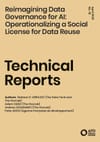📘 What’s Covered
The report is structured around several key elements:
- A diagnosis of current governance failures (consent fatigue, weak provenance, and unbalanced licensing).
- An introduction to social licensing: not as a PR gesture but as a continuous, enforceable mechanism for participatory data governance.
- A three-phase framework:
- Phase 1: Engage communities to define expectations and conditions.
- Phase 2: Translate those into formal agreements.
- Phase 3: Set up enforcement pathways (legal, technical, community-led).
- A Social Licensing Toolkit, including:
- A detailed questionnaire to guide community engagement.
- Sample clauses to integrate social licensing into data agreements.
- Realistic case scenarios for application across use cases.
- Strategic recommendations for scaling adoption, creating Centers of Excellence, and embedding social licensing into policy and funding decisions.
💡 Why It Matters?
The report tackles a core challenge in AI governance: most affected communities have zero influence over how their data is used. By shifting governance from individual consent to community-defined preferences, this framework enables real accountability and helps reduce harm and exclusion—especially for marginalized groups. It’s particularly timely as the EU AI Act and other frameworks start to push beyond narrow privacy toward collective and equitable data governance.
🚧 What’s Missing?
- The enforcement piece (Phase 3) is flagged as underdeveloped. Although some ideas are proposed (certifications, DAOs, audits), most are theoretical or aspirational.
- There’s no direct alignment yet with existing legal regimes (e.g., how social licenses interact with GDPR or AI Act requirements).
- The operational cost and administrative load for community engagement at scale are acknowledged but not fully solved.
👍 Best For
- Development agencies working on digital public goods or data-for-development initiatives.
- AI governance professionals who want to go beyond fairness checklists and address power imbalances at the system level.
- Civil society actors advocating for Indigenous data sovereignty or responsible data stewardship.
- Contract drafters looking to implement enforceable, community-driven clauses in AI or data sharing agreements.
📚 Source Details
Title: Reimagining Data Governance for AI: Operationalizing a Social License for Data Reuse
Authors: Stefaan G. Verhulst, Adam Zable, Andrew Zahuranec (The GovLab); Peter Addo (AFD)
Published by: Agence Française de Développement (AFD), April 2025
Format: 58 pages, includes appendices, diagrams, and sample legal clauses
Available at: editions.afd.fr


